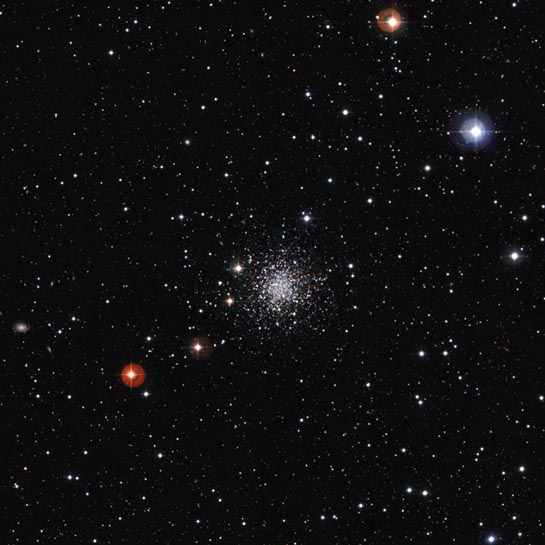
Against a Stunning Background
Description: Globular Star Cluster
Position (J2000): RA 06h 30m 12.11s Dec -64° 19' 36.95"
Constellation: Dorado
Visual magnitude: 13.5
Angular dimensions: 3.4arcmin
Distance: 170, 000 light years
Field of view: 18.80 x 18.80 arcminutes
Orientation: North is 0.0° right of vertical
Image Credit: ESO
Release date: November 15, 2010
ABOUT THIS IMAGE:
Among the myriad of stars in this image shines NGC 2257, a collection of cosmic gems bound tightly by gravity. Many billions of years old, but still sparkling brightly, it is an eye-catching astronomical object.
NGC 2257 is a globular cluster, the name given to the roughly spherical concentrations of stars that orbit galactic cores, but are often found far out from the centers in the halo areas of galaxies. Globular clusters contain very old stars, being typically over 10 billion years old, and can therefore be used like a "fossil record" to learn more about the Universe's past. They are densely packed, with tens to hundreds of thousands of stars gathered within a diameter of just a few tens of light-years. NGC 2257 lies on the outskirts of the Large Magellanic Cloud (LMC), a satellite galaxy of our own Milky Way. It is one of 15 very old globular clusters in the LMC.
The image is made from data taken with the Wide Field Imager instrument on the 2.2-meter MPG/ESO telescope at La Silla, in B, V and I filters, which are shown here in blue, green and red respectively. The field of view is approximately 20 by 20 arcminutes. These observations were made as part of the ESO Imaging Survey project, which was planned to make public imaging surveys to identify targets for follow-up observations with the Very Large Telescope.